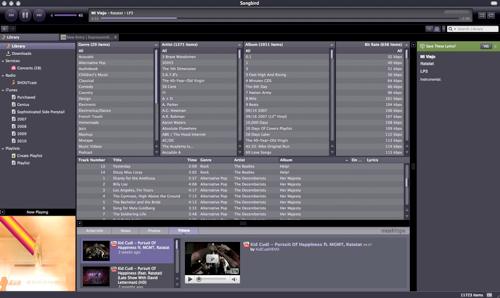REVIEW: Songbird 1.4.3—An Alternative to iTunes
When I'm at my computer, I usually experience music through a combination of iTunes and my web browser. For example, if I'm listening to an album I enjoy, I'm also probably digging through The Hype Machine trying to find more songs by the artist, browsing YouTube or Vimeo to find music videos from the album, and checking out the artist's Wikipedia page to read his/her bio and look through his/her discography. Songbird's marketing pitch is essentially based on this behavior: an open-source application built for Mac, Windows and Linux. It's a media manager and web browser combined into one.
I found the program to be an interesting alternative to iTunes, maybe not for me personally, but perhaps invaluable to others. In this review, I'll run through my initial reactions to Songbird, as well as its pros and cons.
Songbird was first released in February 2006, and looked very promising, but early versions of the software crashed early and often on my computer. Specifically, I think the application had a big problem with importing my 70GB music library, as it would crash halfway through the process. The newest iteration of the software, 1.4, has no such problems. It's a dramatic improvement even from builds I tested only four months ago.
However, there are still a few areas where Songbird runs slowly. It might be a good idea to turn off the feature which scans your entire iTunes library for new songs upon each startup, but overall it performs great on the Mac, and in some cases runs faster than iTunes. While Spotlight in iTunes takes a few seconds to retrieve results, I can filter a list of tracks near-instantaneously with the search box in Songbird.

As you can see, Songbird was designed as a cross-platform app, and thus doesn't have the aesthetic touches of a Mac-native program. Like the Mozilla engine it's built on, Songbird allows for Firefox-like add-ons and extensions, and I have two of them installed in the screenshot above. On the bottom is the mashTape addon, which lets you browse through artist bios, news, photos and YouTube videos related to the currently playing track. On the right are lyrics for the track grabbed from the Web, as well as a dialog box asking if you'd like to save the lyrics to the track's metadata.
You can certainly find similar lyrics plugins for use in iTunes, but one thing I really appreciate about Songbird is how it integrates these web-enabled plugins to make them feel like a seamless part of the application. For example, there's an iTunes extension called iConcertCal that I love, since it grabs the artists in my music library to generate a list of who's playing a concert soon in my zip code. But it's essentially an iTunes hack (the plugin masquerades as a visualizer), whereas the SongKick Concerts extension in Songbird appears as a link within the sidebar and is fully integrated within the UI.
There are tons of extensions in Songbird designed to both integrate fully within the app and take advantage of your favorite services: there are extensions for your preferred digital music stores (whether 7digital or eMusic) to occupy an iTunes Store-like link in the sidebar, and there are search bar extensions so you can search Grooveshark or Hype Machine with just a a simple drop-down menu.
In addition to being a perfectly capable media player, Songbird is also an adequate web browser: in fact, I'm using it right now to write this post. But there are two huge drawbacks to Songbird that make it difficult to fully endorse this product: lack of support for the iPod and for CD ripping. CD ripping is supported in the Windows version of Songbird, and its developers say the next version of the Mac software will support ripping. But it's unclear when, if ever, Songbird will support iPod syncing. There are extensions which support it, but surrendering components of your product's functionality to an amateur developer community has its drawbacks.
Although there are great extensions which perform well on Songbird, others can slow the program down or even lead to a crash. I had to uninstall MediaFlow, a Cover Flow-like browsing view for my albums, because it was taking upwards of 10 minutes to load all of my album art, locking up my machine in the process. An extension that enabled Quicktime media playback let me play back my FairPlay-protected iTunes Store purchases with no problems, but wouldn't let me play back video as Songbird wouldn't support it. Instead, it would import the video and attempt to play back only the audio track, slowing down my machine in the process.
While there were many features of Songbird I love and don't feel like I want to go without, I think I'm going to stick with iTunes for now. I'm still as excited by the promise Songbird holds as I was in 2006. Maybe in a year or so, once it gains support for CD ripping, the developer-created extensions have matured a little more and the UI's gotten a little more polished, I'll think it's worth switching over to. Until then, I recommend anyone reading this to do what I did—download it, poke around and see if it's right for you.


Comments
It can also manage your files the way iTunes does if you want that, but not by default. -Yochanan Berkowitz
I visited a guitar store Jacksonville FL yesterday and let me tell you that I listened to some great songs there. I tried to find those on itunes but didn’t have much success. This was a big surprise for me.